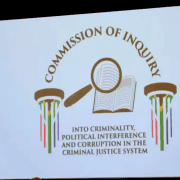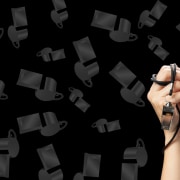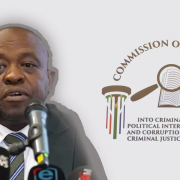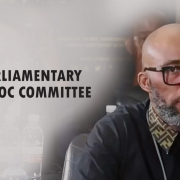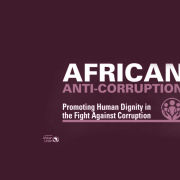|
Getting your Trinity Audio player ready...
|
By Lonwabo Patrick Kulati
First published on Daily Maverick
Greg Mills, in his book Why States Recover, illustrates that the key reason behind economic failure is politics: “Today, the bulk of the world’s poor – totalling 1.1 billion of the planet’s seven billion people – live in failed or failing states,” he states.
The continued failure of South Africa’s political leadership to deal decisively with corruption by holding the perpetrators accountable is turning this country into a failing or failed state. South Africans are sick to death of persistent corruption by political leaders.
It seems we are headed for a possibly violent revolution if impunity is not stopped urgently. If you don’t believe me, just look at the agitation of ordinary people who loudly express their support for Lieutenant-General Nhlanhla Mkhwanazi. On social media, some have even threatened widespread looting if something bad were to happen to him.
Against the backdrop of July 2021’s devastating riots, we are treading on dangerous ground. Mkhwanazi represents an idea of the people’s hatred of the impunity of the corrupt elite. People are infuriated by the repetition of hollow anti-corruption rhetoric by those in power, yet they know that behind the scenes they are colluding with criminals to milk Treasury dry.
Writing in Good Governance Africa’s flagship publication, Africa in Fact (special edition on the proposed international anti-corruption court or IACC), researcher Nnaemeka Ohamadike states that “the gap between anti-corruption rhetoric and real law enforcement remains a breeding ground for impunity, weakening governance and leaving citizens to bear the cost, especially in Africa”.
He further refers to the World Bank’s definition of corruption as the extent to which power is “misused for private gain, encompassing both petty and grand corruption, as well as the influence of elites and private interests in capturing state institutions”.
This continues in South Africa year after year, but nothing is done to combat it.
South Africa has been cursed by bad political leadership and policies, from colonial times through to the apartheid period and now the so-called democratic dispensation. Colonial political leaders committed the original sin of dispossessing the indigenous people of their land and resources.
The architects of apartheid curated an effective racist system that balkanised the people of this country and continued to dispossess the people of their land, minerals and other resources and entrenched grand corruption.
Not to be outdone, the post-democracy kleptocratic elites continue their systematic industrial-scale corruption enterprise, siphoning public resources for the benefit of the few.
Mkhwanazi’s revelations are the latest in a string of corruption scandals that have blighted this country since the dawn of democracy. A quick scan of post-1994 South Africa shows a series of major corruption scandals from 1999 to 2021, exposing systemic misuse of public funds and abuse of power by high-ranking officials and political elites.
Starting with the arms deal in 1999, it details successive scandals including Travelgate, Oilgate, the Selebi bribery case, Limpopo tender fraud and high-profile cases such as Nkandla and state capture involving former president Jacob Zuma and the Gupta family.
Despite various investigations and some convictions, many cases ended with limited accountability.
Recent scandals like the Bosasa revelations, PPE corruption during Covid-19, Tembisa Hospital, Life Esidimeni, and the Digital Vibes contract highlight ongoing issues with political patronage, weak enforcement, and slow or stalled prosecutions.
The pattern points to a deeply entrenched culture of corruption within state institutions.
The boldness and audacity of the corrupt criminal elite is increasing while the decisiveness of our political leaders to deal with them is sadly decreasing. It seems that criminal elements are firmly embedded into our political systems in a way that compromises and disempowers our leaders from acting. It is a total failure to deal with corruption, year after year.
Even if Mkhwanazi himself were to be found wanting in some respect, the idea will persist because people are sick of being taken for a ride by the so-called leaders.
In 2011, the South African Constitutional Court judgment in the Glenister case stated that “corruption is… an antithesis to democracy and the rule of law. Corruption diverts resources that are needed to improve the lives of citizens to enrich a few, at great cost to many. Corruption prevents the state from fulfilling its constitutional obligations, erodes the legitimacy of our democratic government and subverts the rule of law.”
As this continues unabated, we must brace ourselves for a very bad retaliation, the likes of which this country has never seen. The only thing that will prevent this is strong action against the powerful political elites who enable and reward corruption in our society.
On 11 July 2025, Karam Singh of Integrity Initiatives International, and Ruth Kolevsohn wrote in the Mail & Guardian that “frustration remains that the criminal justice system in many countries is unable to deal with the weight and magnitude of high volume, multi-actor, multiple jurisdiction transactions… In global systems, where no single jurisdiction can be relied upon to have the political will and modalities to go after kleptocrats and their stolen assets, we need alternative solutions.
“Presently, there is no international institution to hold kleptocrats accountable when the countries they rule are unwilling or unable to do so. The case for establishing an international anti-corruption court (IACC) has been mooted as a feasible solution to address the constraints of domestic systems.”
It is for this reason that Good Governance Africa is partnering with Integrity Initiatives International to promote the establishment of the IACC, and the drafting and ratification of the International Anti-Corruption Court Treaty.
The IACC will hold the criminals accountable under the UN Convention against Corruption.
Lonwabo Patrick Kulati is CEO of Good Governance Africa.

